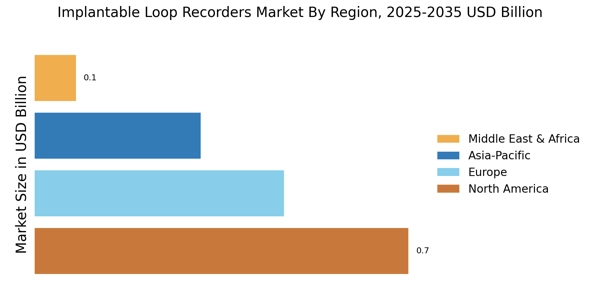Rising Awareness of Cardiac Health
The growing awareness of cardiac health among the general population is driving the Implantable Loop Recorders Market. Educational campaigns and initiatives aimed at promoting heart health have led to increased recognition of the importance of early detection and management of cardiac conditions. As individuals become more informed about the risks associated with arrhythmias and other heart diseases, the demand for effective monitoring solutions rises. This heightened awareness encourages patients to seek medical advice and explore advanced diagnostic options, including implantable loop recorders. The market is likely to benefit from this trend, as healthcare providers respond to the increasing demand for comprehensive cardiac monitoring solutions.
Rising Incidence of Cardiac Arrhythmias
The increasing prevalence of cardiac arrhythmias is a primary driver for the Implantable Loop Recorders Market. As the population ages, the incidence of conditions such as atrial fibrillation and other arrhythmias rises, necessitating advanced monitoring solutions. According to recent data, arrhythmias affect millions worldwide, leading to a growing demand for effective diagnostic tools. Implantable loop recorders provide continuous monitoring, enabling timely detection and management of these conditions. This trend is expected to propel market growth, as healthcare providers seek reliable methods to monitor patients at risk of serious cardiac events. The need for early intervention and personalized treatment plans further emphasizes the importance of implantable loop recorders in modern cardiology.
Growing Demand for Remote Patient Monitoring
The shift towards remote patient monitoring is significantly influencing the Implantable Loop Recorders Market. With the increasing emphasis on telemedicine and home healthcare, there is a rising demand for devices that allow continuous monitoring of patients outside traditional clinical settings. Implantable loop recorders offer a solution by enabling healthcare providers to track patients' cardiac health remotely, thus improving patient outcomes and reducing hospital visits. This trend is particularly relevant in managing chronic conditions, where ongoing monitoring is essential. The convenience and efficiency of remote monitoring are likely to drive market expansion, as both patients and providers recognize the benefits of such technologies.
Technological Innovations in Cardiac Monitoring
Technological advancements play a crucial role in shaping the Implantable Loop Recorders Market. Innovations such as miniaturization of devices, enhanced battery life, and improved data transmission capabilities have made these devices more appealing to both patients and healthcare providers. Recent developments include wireless connectivity and advanced algorithms for data analysis, which facilitate real-time monitoring and remote patient management. These innovations not only enhance the functionality of implantable loop recorders but also improve patient compliance and satisfaction. As technology continues to evolve, the market is likely to witness an influx of new products, further driving growth and adoption in the healthcare sector.
Increased Investment in Healthcare Infrastructure
Investment in healthcare infrastructure is a significant driver for the Implantable Loop Recorders Market. Governments and private entities are increasingly allocating resources to enhance healthcare facilities and services, particularly in cardiology. This investment leads to improved access to advanced diagnostic tools, including implantable loop recorders. As healthcare systems evolve, the integration of these devices into standard care protocols becomes more feasible. Enhanced infrastructure not only supports the adoption of innovative technologies but also fosters research and development in the field. Consequently, the market is poised for growth as healthcare providers seek to implement state-of-the-art solutions for patient care.

















